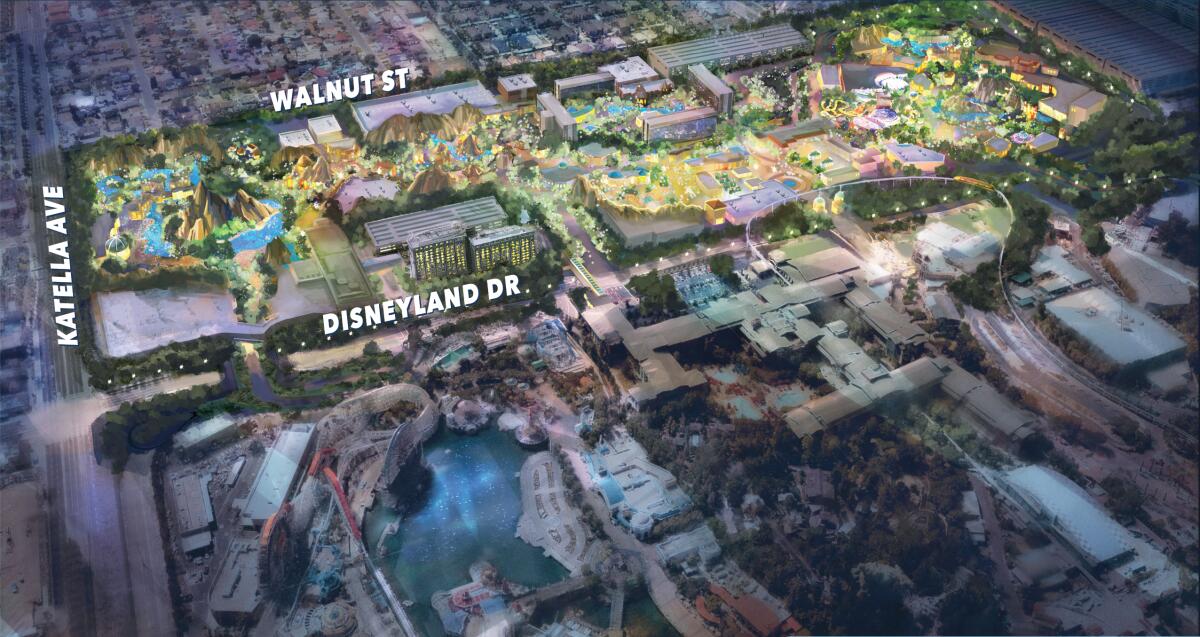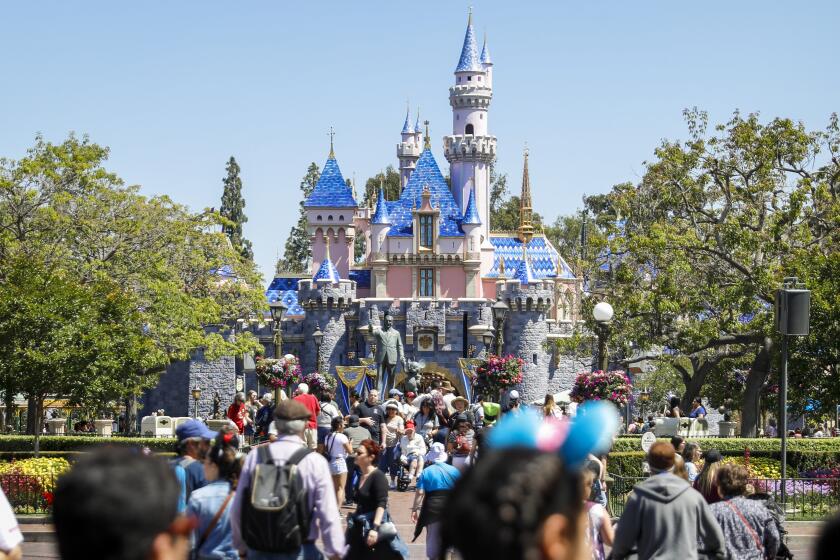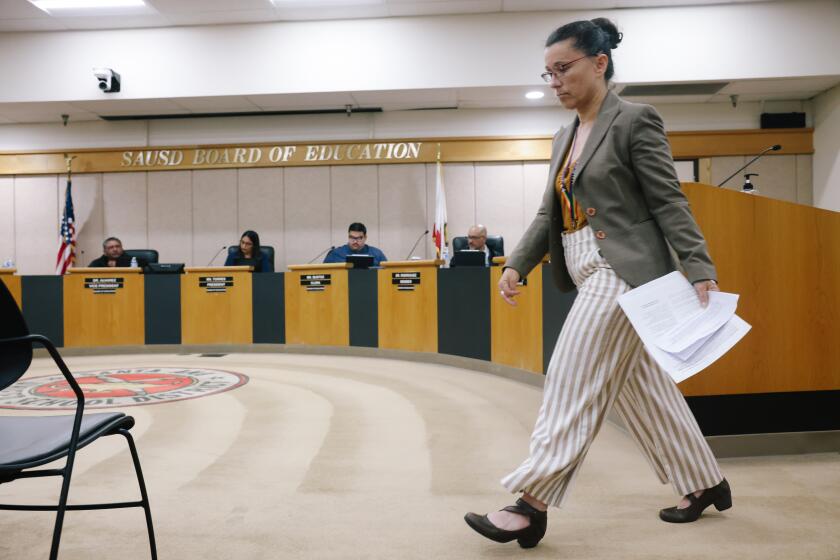‘Disney controls everything’: Resort oversaw Cal State Fullerton report on expansion plan

- Share via
Before voting on a massive Disney expansion in April, Anaheim City Councilman Stephen Faessel professed as conventional wisdom that what’s good for the company is good for the city.
“There seems to be a lot of concern that we’re not seeing everything,” he said. “I’m not sure whether I need to see everything. Every time that there’s been Disney investment, the city benefits.”
Prior to the vote on DisneylandForward, the company’s name for the nearly $2 billion expansion, Disney provided Anaheim with a nine-page executive summary of an economic impact report prepared by the Woods Center for Economic Analysis and Forecasting at Cal State Fullerton.
The summary seemed to back Faessel’s notion with data.
Its rosiest projection stated that a full build-out of Disney theme park, hotel and vacation club entitlements would bring a “dramatic increase in tax revenue” to Anaheim. The estimated $244 million a year from such expansion would double Disney’s current fiscal contribution to the city.
Anaheim officials and residents don’t have the full report on DisneylandForward’s economic impact ahead of the final vote approving the plan.
But council members weren’t able to review the full report before unanimously voting to approve the expansion.
Disney withheld it from the city.
Citing the report and communications about it as Disney’s “exclusive property,” CSUF also withheld documents from a TimesOC records request.
But an agreement inked last year between Disney and Cal State Fullerton Auxiliary Services Corp., a nonprofit that oversees educational contracts, was disclosed and sheds light on the extent of the company’s control over the study that it otherwise described as “an independent economic analysis” on a DisneylandForward website.

The contract is clear that Disney owns the report, which is referred to as the “work product,” in “perpetuity throughout the universe.”
That includes all written work, research, questionnaires, spreadsheets and databases that may have informed the study’s research and findings.
The ownership claim has rankled California Public Records Act experts.
“It’s ironic that Cal State Fullerton is citing the ‘strong public interest served by protecting the integrity of academic research’ while hiding the report from the public and even redacting the fee paid for the report,” said Karl Olson, an attorney who specialized in public records law before retiring after 42 years of practice. “Cal State Fullerton’s attempt to hide the report from the public itself casts doubt on it.”
Even though the payment was redacted from the contract, Woods Center co-director Anil Puri disclosed in a previous article that Disney commissioned the report for $150,000.
Per its terms, Disney outlined that university economists would conduct research “to demonstrate the positive economic impacts generated by the Resort” on Anaheim, Orange County and California.
The company also had the right to request revisions within 15 business days of receiving drafts from the university’s economists. Disney further called for the final report to be delivered after its authors incorporated the comments received from the company.
CSUF economists also signed over any rights to challenge Disney in court or elsewhere over how the company decided to “exploit” the study.
Disneyland Resort executive Carrie Nocella is one of the unnamed “ringleaders” of a “cabal” that an FBI affidavit says runs Anaheim, according to a source familiar with the FBI inquiry. She is not accused of wrongdoing.
“What’s key is that Disney controls everything,” said John Crompton, a distinguished professor of recreation, park and tourism sciences at Texas A&M University. “That’s a reasonable thing for them to do. They paid for it.”
Previously, CSUF received a $75,000 grant from Disney to do a study in 2018, which found the Disneyland Resort generated $8.5 billion in economic impact to Southern California.
That report also wasn’t publicly released but wasn’t tied to any public policy decisions.
Disney spokespersons declined to answer detailed questions about the more recent DisneylandForward study’s terms, including whether they reviewed and revised the report.
“We were free to study any impacts that we deemed appropriate under the contract,” said Puri in an email to TimesOC. “The report was independently written and produced with no interference from Disney or any other external entity.”
The study used a forecasting model known as IMPLAN, which Crompton noted can be a valuable tool in past scholarly articles but is also subject to manipulation to produce the desired statistics sought by study sponsors.
“I am in no position to criticize the Disney study because there’s no methodology I can look at,” Crompton said. “But it’s interesting that it’s Disney who provided the input data for the models. All the models can do is process the impact data they’re given.”

Before getting to work, CSUF economists agreed that Disney “has the right, but not the obligation” to share the report with Anaheim.
Mike Lyster, an Anaheim spokesman, said the city had no reason to question the university’s forecasting figures.
“No economic impact report was required for the project,” he added. “The economic benefit of turning parking lots into visitor attractions is obvious.”
John Pelissero, director of government ethics at the Markkula Center for Applied Ethics at Santa Clara University, said that Anaheim and its elected officials still had the responsibility to consider both the positive and negative economic impacts of DisneylandForward.
“There has to be a level of independent analysis done by the city when it is considering a major set of policies that will largely benefit one corporate landowner,” Pelissero said. “As a public official you can’t simply accept the arguments that are being presented to you by Disney and its hired consultant about this without being able to do your own due diligence on the project.”
Anaheim has not commissioned a study of its own on the project.
After DisneylandForward’s final approval in May, the company sent celebratory mailers to residents proudly hailing the next chapter of Walt Disney’s legacy in the city.
The glossy mailers beamed that in addition to new themed lands, rides and entertainment arriving to existing Disney properties, the expansion would generate $202 million in additional tax revenue for Anaheim within 10 years.
DisneylandForward would also lead to 8,960 new construction jobs and 4,584 permanent hospitality jobs in that same time.
The stats came by way of the CSUF report.
For transparency’s sake, Crompton suggested Disney could have released the full report while the city commissioned a study looking into the costs of expansion to provide “another side of the balance sheet.”
But that didn’t happen.
“It’s unfortunate that economic impact studies are allowed to not be transparent,” Crompton said. “When they’re not transparent, it arouses people’s suspicions, rightly or wrongly.”
All the latest on Orange County from Orange County.
Get our free TimesOC newsletter.
You may occasionally receive promotional content from the Daily Pilot.






